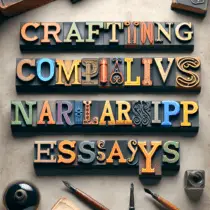Mastering the Craft of Writing Compelling Scholarship Essays
Writing a compelling scholarship essay is an essential skill for students seeking financial aid for their education. A well-crafted scholarship essay can make the difference between securing funding and missing out on valuable opportunities. The hardest part of applying for scholarships is often articulating one’s experiences, aspirations, and individuality in a way that captivates the reviewers. With thousands of applications submitted to scholarship organizations, standing out becomes crucial. Here, we explore effective strategies for mastering the craft of writing powerful scholarship essays.
1. Understanding the Purpose
The primary objective of a scholarship essay is to persuade the awarding body that you are the ideal candidate. It’s not just about financial need but also about demonstrating passion, leadership, and dedication. The essay is an opportunity to showcase your achievements and how the scholarship will aid your educational and career goals.
2. Analyzing the Prompt
Carefully reading and analyzing the scholarship essay prompt is vital. Understanding what the committee is asking allows students to tailor their responses appropriately. If the question asks for specific experiences or future aspirations, ensure that the essay addresses these directly.
3. Researching Available Scholarships
Before writing, it’s important to research the scholarships available. Websites are a great resource, but students often wonder, "Does this website have any scholarships from Poland available?" Many international scholarships, such as the Polish Fulbright Program, offer opportunities for students to study abroad or facilitate cultural exchange. Identifying relevant scholarships enables students to target their essays precisely.
4. Creating an Outline
A structured outline serves as the backbone of any well-written essay. It helps organize thoughts and ensures that all important points are covered. Begin with an engaging introduction, follow with a body that presents main arguments or stories, and conclude with a strong, reflective ending that ties everything together.
5. Crafting a Compelling Introduction
The introduction is the first impression the reviewer will have of the applicant. A strong thesis or an anecdotal opening can effectively capture the reader’s attention. This section should introduce the applicant’s main argument or identity, setting the tone for the rest of the essay.
6. Showcasing Personal Experiences
The heart of a scholarship essay lies in the personal stories and experiences shared by the applicant. Rather than merely stating achievements, explain the journey and lessons learned along the way. Describe situations where leadership, resilience, or problem-solving skills were utilized, offering insights into personal growth.
7. Reflecting on Challenges
Discussing challenges faced and overcome is particularly impactful. It demonstrates perseverance and the ability to adapt. Scholarship committees appreciate applicants who show maturity in reflecting on their struggles and how these experiences have shaped their future goals.
8. Connecting Aspirations with the Scholarship
Clearly articulating how receiving the scholarship aligns with personal and professional goals is crucial. Illustrate how the scholarship will help bridge gaps, provide opportunities, and enable you to contribute meaningfully to your field of study or community. This connection is the thread that ties the essay together.
9. Editing and Proofreading
No essay should be submitted without thorough editing and proofreading. Typos, grammatical errors, and awkward phrasing can detract from the content and reduce the essay’s impact. Seek feedback from peers, mentors, or educators, as fresh eyes can catch errors that might have been overlooked.
10. Finalizing the Essay
After incorporating feedback and making necessary revisions, finalize the essay by ensuring it adheres to any specified guidelines. This includes checking the word count, format, and submission requirements. A polished final draft reflects the applicant’s diligence and attention to detail.
11. Understanding Common Mistakes
Common mistakes in scholarship essays include failing to answer the prompt, boasting without substantiation, and providing generic responses. Essays should remain focused, authentic, and provide a distinct voice that represents the applicant genuinely.
12. Exemplifying Values and Ethics
Ethics and values often play a role in scholarship selection criteria. Essays that reflect strong moral principles and demonstrate a commitment to community and societal contribution tend to resonate well with scholarship committees.
13. Practicing Empathy and Inclusivity
A successful scholarship essay often displays empathy and inclusivity. Demonstrating awareness and appreciation of diverse perspectives can strengthen the narrative. Essays that highlight projects or experiences involving volunteer work, cultural exchange, or advocacy often have a lasting impression.
14. Balancing Enthusiasm with Professionalism
While enthusiasm for one’s field of study is crucial, maintaining a professional tone is equally important. Avoid overly casual language or slang and focus instead on clear, concise, and compelling storytelling. Balance personal passion with professionalism to create a well-rounded essay.
15. Embracing Authenticity
Finally, authenticity is the cornerstone of an outstanding scholarship essay. Committees are skilled at identifying genuine narratives versus those that are exaggerated or fabricated. Students should focus on being honest about their experiences and aspirations, ensuring their unique voice shines through.
In conclusion, mastering the craft of writing compelling scholarship essays takes time, reflection, and practice. Success comes from understanding the audience, personal introspection, and conveying one’s story authentically and articulately. By following these strategies, students can increase their chances of standing out in the competitive landscape of scholarship applications.






